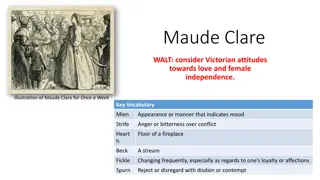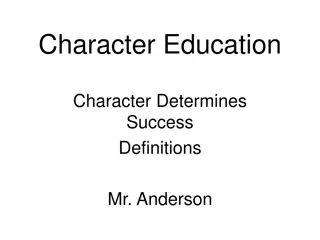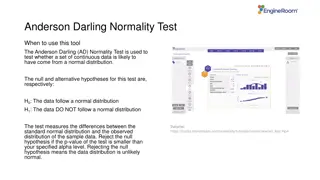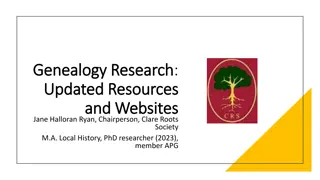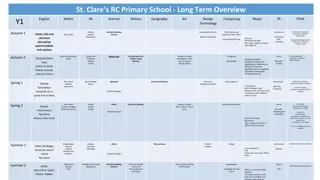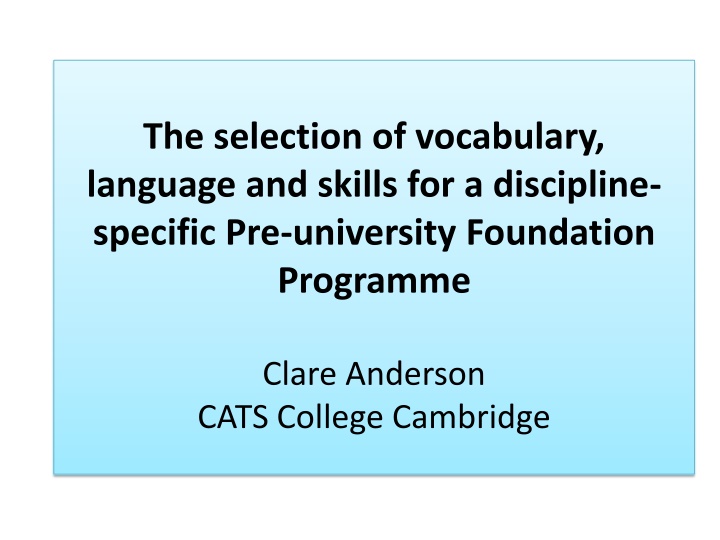
Effective Vocabulary and Skills Selection in Pre-University Foundation Programmes
Enhancing academic vocabulary, language proficiency, and skills is crucial for students in University Foundation Programmes. This article discusses the importance of tailoring vocabulary, language, and skills to specific disciplines, along with balancing coursework requirements and student needs. It also explores sources and examples for effective vocabulary and skill development in programs like UFP.
Download Presentation

Please find below an Image/Link to download the presentation.
The content on the website is provided AS IS for your information and personal use only. It may not be sold, licensed, or shared on other websites without obtaining consent from the author. If you encounter any issues during the download, it is possible that the publisher has removed the file from their server.
You are allowed to download the files provided on this website for personal or commercial use, subject to the condition that they are used lawfully. All files are the property of their respective owners.
The content on the website is provided AS IS for your information and personal use only. It may not be sold, licensed, or shared on other websites without obtaining consent from the author.
E N D
Presentation Transcript
The selection of vocabulary, language and skills for a discipline- specific Pre-university Foundation Programme Clare Anderson CATS College Cambridge
Context University Foundation Programme (UFP) progression to university place in one year 5 hours English per week, 3 IELTS, 2 ESAP: Academic Skills for UFP Students from: GCSE or A-level year 1 Business, Sciences and Social Sciences Re-inclusion of coursework Class size; up to 3 subjects supported per group
UFP students Age English level 4.5 7.0 Attitude to English language The relevance question
Factoring-in UFP-wide issues some pre-sessional goals Prioritising and balancing needs: tutors Intensive course AS & A2 type modules Course content timely delivery vs student comprehension Coursework deadlines Exam practice & revision Solution: the EAP tutor (!) In-sessional course plus Prioritising and balancing needs: students Easier than A-levels English language work? Really? Expectation of evening & weekend study unreasonable! EAP tutors will proof-read project/coursework Academic Skills sessions: Ah!
Vocabulary & skills choices Vocabulary specific to whole course OR limit to academic communication? Coursework preparation: genre, academic skills eg research, note-taking, paraphrase Term 3: essay type exam Q&A eg Business case studies
Sources Tutor notes College Coursework briefing sheets EAP Formative assessment briefing sheets Past student Coursework Online revision sites Online audio-visual content: Youtube; bbc online Corpora for secondary level?
Working example 1: Accounting Lexis from tutor s Accounting Study Guide Chapter 1: given EAP treatment youtube accounting content: https://www.youtube.com/watch?v=3y- ZfzoER_I Word formation review and extension EAP assessment 1: Academic poster
Example 2: Accounting Understanding a UFP Accounting Coursework part 2 briefing sheet Becomes interactive EAP worksheet Monitored by EAP & Accounting tutors Students explain in own words in L2
Example 3: Business Exploiting case studies for extended exam Q&A plus vocabulary revision Audio-visual files help lower reading level students eg Vietnamese start-up queen Vocabulary Marketing vocabulary links: Youtube https://www.youtube.com/watch?v=qLn1rAu ZuVA
Example 4: Business Supporting Coursework Part 2 Building a formative assignment (CSR) Teaching the academic conventions, skills & vocabulary within that
Raise student engagement Student engagement: EAP assessments formative for coursework & vocabulary Specific mention in term reports to parents Support of colleagues across disciplines Peer visits Modified team teaching
Logistics Complexities of Schemes of work Class timing Late-comers to the course Importance of reinforcement from cross departmental cooperation Writing & adapting the material
Action research Student attitudes: generic academic skills Student attitudes: subject specific academic skills and vocabulary Students with pre-intermediate English
Many thanks! clareanderson1@gmail.com

